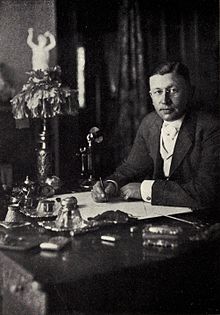Bud Nelson (canine)
| Horatio Nelson Jackson | |
|---|---|

Jackson as photographed in 1913
|
|
| Born | March 25, 1872 Toronto, Ontario, Canada |
| Died | January 14, 1955 (aged 82) Burlington, Vermont, United States |
| Occupation | Physician, automobile pioneer |
Horatio Nelson Jackson (March 25, 1872 – January 14, 1955) was an American physician and automobile pioneer. In 1903, he and driving partner Sewall K. Crocker became the first people to drive an automobile across the United States.
Born in Toronto, Ontario, Canada, to American parents, Jackson graduated from the University of Vermont in 1893, became a physician, and practiced in Brattleboro and Burlington, Vermont. He was married to Bertha Richardson Wells, the daughter of William Wells, a Medal of Honor recipient and one of the richest men in Vermont as a partner in Wells, Richardson & Co., manufacturer of Paine's Celery Compound, a popular patent medicine.
Besides his medical practice, Jackson was a 31-year-old auto enthusiast who differed with the then-prevailing wisdom that the automobile was a passing fad and a recreational plaything. While in San Francisco's University Club as a guest on May 18, 1903, he agreed to a $50 wager (equivalent to $1,333 in 2016) to prove that a four-wheeled machine could be driven across the country. He accepted even though he did not own a car, had practically no experience driving, and had no maps to follow. Jackson and his wife planned to return to their Burlington, Vermont, home in a few days, and both had been taking automobile driving lessons while in San Francisco. She returned home by train, allowing him to take his adventure by automobile.
Having no mechanical experience, Jackson convinced a young mechanic and chauffeur, Sewall K. Crocker, to serve as his travel companion, mechanic, and backup driver. Crocker suggested that Jackson buy a Winton car. He bought a slightly used, two-cylinder, 20 hp Winton, which he named the Vermont, after his home state, bade his wife goodbye, and left San Francisco on May 23, carrying coats, rubber protective suits, sleeping bags, blankets, canteens, a water bag, an axe, a shovel, a telescope, tools, spare parts, a block and tackle, cans for extra gasoline and oil, a Kodak camera, a rifle, a shotgun, and pistols.
...
Wikipedia
